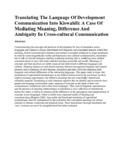| dc.contributor.author | Zaja, James Omboga | |
| dc.date.accessioned | 2013-06-24T15:50:43Z | |
| dc.date.available | 2013-06-24T15:50:43Z | |
| dc.date.issued | 2011 | |
| dc.identifier.citation | James Omboga Zaja, Translating The Language Of Development Communication Into Kiswahili: A Case Of Mediating Meaning, Difference And Ambiguity In Cross-cultural Communication, Swahili Forum18 (2011): 97-113 | en |
| dc.identifier.uri | http://www.qucosa.de/fileadmin/data/qucosa/documents/9057/18_07_Omboga%20Zaja.pdf | |
| dc.identifier.uri | http://erepository.uonbi.ac.ke:8080/xmlui/handle/123456789/39273 | |
| dc.description.abstract | Communicating the concepts and practices of development by way of translation across languages and cultures is always intertwined with linguistic and conceptual tensions which blur meaning, distort communicative intention and nurture conceptual ambiguity in target paradigms. In order to create linguistically viable and functional cross-cultural communication, translation has to rely on myriad strategies entailing mediating meaning, that is, rendering cross-cultural communications in ways that make intended meaning accessible and usable. Meanings of concepts and their practices are subtly nuanced and understood in different languages and cultures. Meaning nuances as such denote tensions between incongruent linguistic and cultural interests and in situations of such tensions, translation provides
a forte for mediating both linguistic and cultural differences of the interacting languages. This paper seeks to argue that translations of specialized terminologies in any field of human activity do not always result in explicit meaning equivalences, but rather in
meanings that are contextually situated and culturally nuanced. Translating in such situations requires that we identify and account for how people and language communities make meaning of concepts on the basis of their own circumstances, worldviews and in their local languages. Thus, lack of linguistic equivalencies and the presence of meaning indeterminacy in translation is not a reflection of translational failure but rather, a calling to attention of the differences in the perceptions and interpretations of concepts across languages, which in subtle ways represent
modes of thinking and communicating (Hoppers 2002). Successful and functional translation of specialized terminologies must be underpinned by the realization that conceptual meanings are always situated in cultural, contextual and temporal terms. Their transmission through translation into ‘new’ contexts can never be straightforward but rather mediated. | en |
| dc.language.iso | en | en |
| dc.publisher | University of Nairobi | en |
| dc.title | Translating The Language Of Development Communication Into Kiswahili: A Case Of Mediating Meaning, Difference And Ambiguity In Cross-cultural Communication | en |
| dc.type | Article | en |
| local.publisher | College of Humanities and Social Sciences | en |

